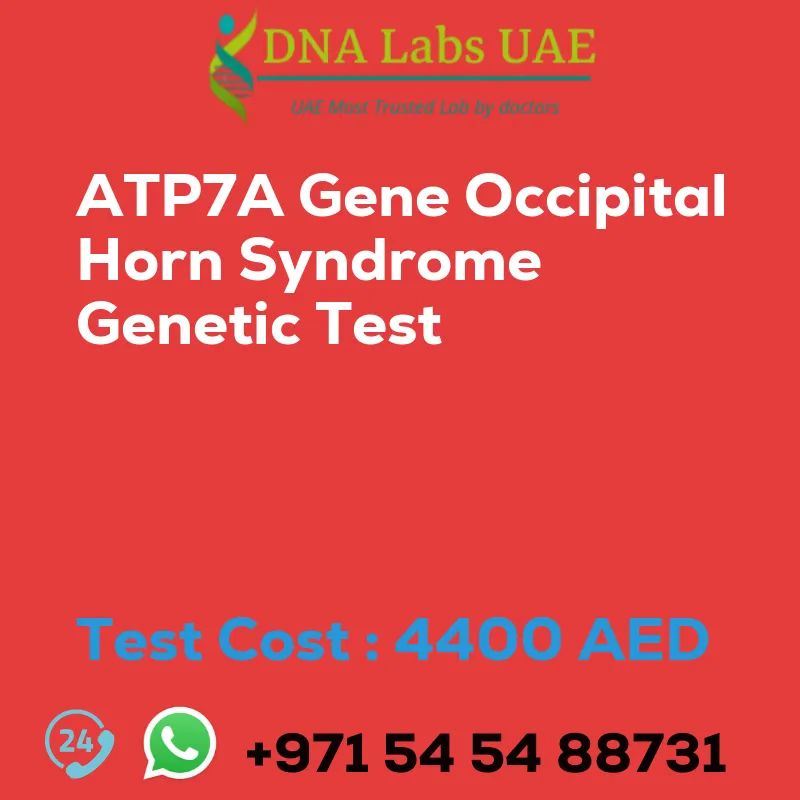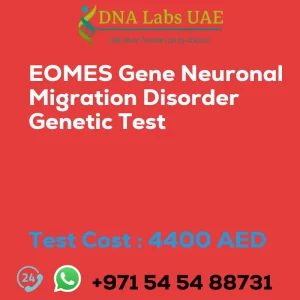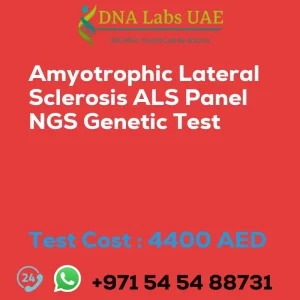ATP7A Gene Occipital Horn Syndrome Genetic Test
Are you concerned about Occipital Horn Syndrome (OHS)? DNA Labs UAE offers a comprehensive genetic test to detect mutations in the ATP7A gene associated with OHS. Our ATP7A Gene Occipital Horn Syndrome Genetic Test can provide accurate diagnosis and personalized management and treatment plans. Read on to learn more about this test.
Test Details
The ATP7A gene, also known as the copper-transporting P-type ATPase gene, is responsible for producing a protein that plays a crucial role in copper transport within the body. Mutations in this gene can lead to a rare genetic disorder called Occipital Horn Syndrome (OHS), also known as X-linked cutis laxa or Ehlers-Danlos Syndrome (EDS) type IX.
OHS is characterized by several symptoms, including connective tissue abnormalities, lax and sagging skin, joint hypermobility, bladder diverticula, and occipital exostoses (bone protrusions at the base of the skull). Individuals with OHS may also have neurological symptoms, such as intellectual disability and seizures.
Our ATP7A Gene Occipital Horn Syndrome Genetic Test utilizes Next-generation sequencing (NGS) technology to identify mutations in the ATP7A gene associated with OHS. NGS allows for the simultaneous analysis of multiple genes, providing a comprehensive view of an individual’s genetic makeup. This type of testing can help confirm a diagnosis of OHS and identify specific mutations within the ATP7A gene.
The testing process involves extracting DNA from a blood or saliva sample and sequencing the ATP7A gene using high-throughput sequencing technologies. The resulting genetic data is then analyzed and compared to a reference genome to identify any disease-causing mutations.
Test Components and Price
Our ATP7A Gene Occipital Horn Syndrome Genetic Test is priced at 4400.0 AED. The test can be performed using a blood sample, extracted DNA, or even one drop of blood on an FTA card.
Report Delivery and Test Department
After the sample is collected, the report will be delivered within 3 to 4 weeks. The test is conducted in our Genetics department, overseen by qualified geneticists and genetic counselors.
Pre Test Information
Prior to the test, it is essential to provide the clinical history of the patient who is undergoing the ATP7A Gene Occipital Horn Syndrome NGS Genetic DNA Test. Additionally, a genetic counseling session will be conducted to draw a pedigree chart of family members affected by ATP7A Gene Occipital Horn Syndrome. This information helps in accurate diagnosis and personalized management.
Why Choose NGS Genetic Testing?
NGS genetic testing allows for accurate diagnosis, genetic counseling, and personalized management and treatment plans for individuals with OHS. It can also be used for carrier testing in individuals with a family history of OHS or for prenatal testing in at-risk pregnancies. The comprehensive analysis of the ATP7A gene through NGS testing provides valuable information for individuals and their families.
It is important to note that NGS genetic testing should be conducted and interpreted by qualified healthcare professionals, such as geneticists or genetic counselors, who can provide appropriate guidance and support throughout the testing process.
Don’t let uncertainty linger. Take control of your health and the health of your loved ones with our ATP7A Gene Occipital Horn Syndrome Genetic Test. Contact DNA Labs UAE today to schedule an appointment or for more information.
| Test Name | ATP7A Gene Occipital horn syndrome Genetic Test |
|---|---|
| Components | |
| Price | 4400.0 AED |
| Sample Condition | Blood or Extracted DNA or One drop Blood on FTA Card o |
| Report Delivery | 3 to 4 Weeks |
| Method | NGS Technology |
| Test type | Neurological Disorders |
| Doctor | Neurologist |
| Test Department: | Genetics |
| Pre Test Information | Clinical History of Patient who is going for ATP7A Gene Occipital horn syndrome NGS Genetic DNA Test A Genetic Counselling session to draw a pedigree chart of family members affected with ATP7A Gene Occipital horn syndrome |
| Test Details |
ATP7A gene, also known as the copper-transporting P-type ATPase gene, is responsible for producing a protein that plays a crucial role in copper transport within the body. Mutations in this gene can lead to a rare genetic disorder called Occipital Horn Syndrome (OHS), also known as X-linked cutis laxa or Ehlers-Danlos Syndrome (EDS) type IX. OHS is characterized by several symptoms, including connective tissue abnormalities, lax and sagging skin, joint hypermobility, bladder diverticula, and occipital exostoses (bone protrusions at the base of the skull). Individuals with OHS may also have neurological symptoms, such as intellectual disability and seizures. Next-generation sequencing (NGS) genetic testing is a diagnostic tool used to identify mutations in the ATP7A gene associated with OHS. NGS allows for the simultaneous analysis of multiple genes, providing a comprehensive view of an individual’s genetic makeup. This type of testing can help confirm a diagnosis of OHS and identify specific mutations within the ATP7A gene. NGS genetic testing involves extracting DNA from a blood or saliva sample and sequencing the ATP7A gene using high-throughput sequencing technologies. The resulting genetic data is then analyzed and compared to a reference genome to identify any disease-causing mutations. The identification of specific mutations in the ATP7A gene through NGS testing can be beneficial for individuals and their families. It allows for accurate diagnosis, genetic counseling, and personalized management and treatment plans. Additionally, NGS testing may also be used for carrier testing in individuals with a family history of OHS or for prenatal testing in at-risk pregnancies. It is important to note that NGS genetic testing should be conducted and interpreted by qualified healthcare professionals, such as geneticists or genetic counselors, who can provide appropriate guidance and support throughout the testing process. |








